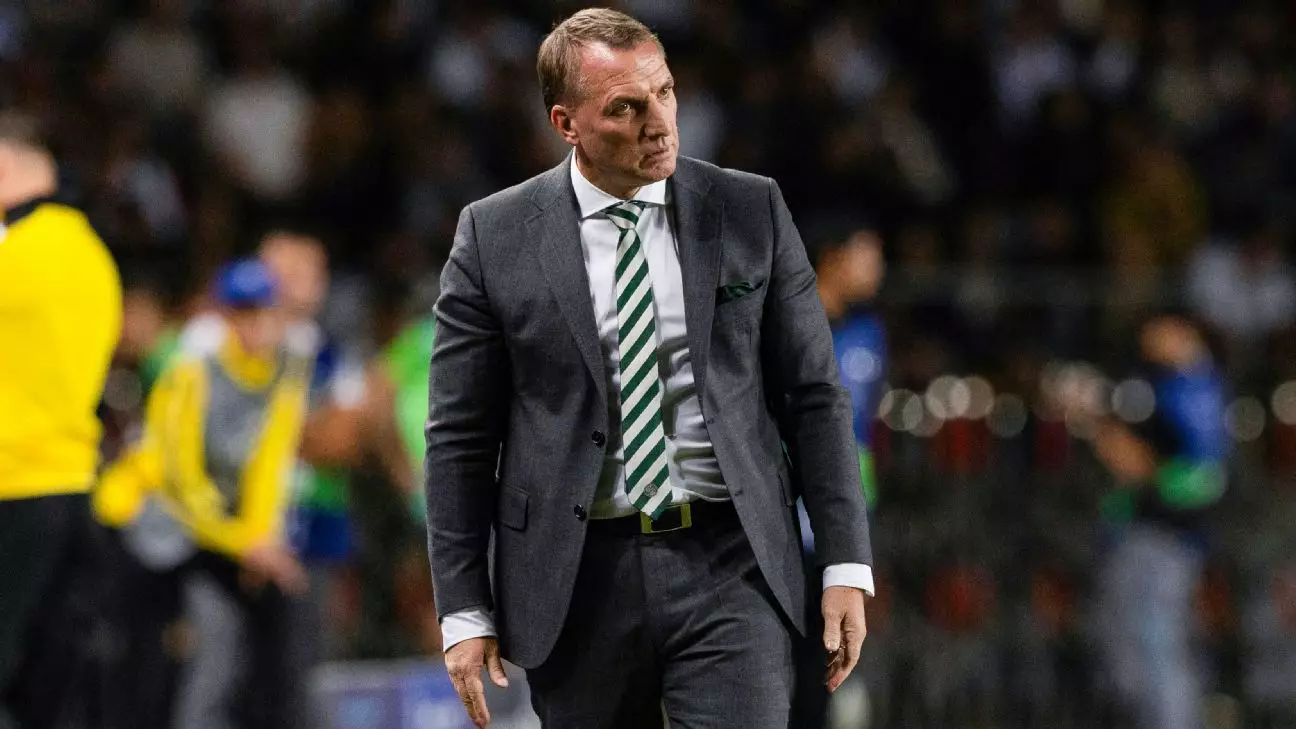Celtic’s recent failure to qualify for the Champions League underscores a deeper issue that transcends a single match; it exposes the club’s struggles with strategic foresight and resource allocation. Brendan Rodgers, the manager, expressed palpable frustration—not solely over the defeat but over the underlying systemic flaws. The failure to reinforce the squad adequately before a critical playoff clash became evident in the game’s pensive outcome. Despite last season’s promising performances and the strides made against elite European opposition, Celtic’s transfer activity remains underwhelming given the club’s lofty ambitions.
Investments, or the lack thereof, are a defining factor. Plagued by minimal expenditure—around £3 million spent on new players—Celtic’s roster appears unbalanced and fragile when tested against seasoned opponents like Kairat Almaty. The absence of reinforcements in key attacking positions, especially after losing Jota to injury and Künn’s departure, left Rodgers lamenting missed opportunities. The strategic neglect of broadening the attacking arsenal outside of existing options reflects a shortsighted approach that ultimately hamstrung Celtic’s ability to compete at the highest levels. Without meaningful reinforcements, the team relied heavily on familiar, yet predictably limited, personnel, exposing vulnerabilities that opponents quickly exploited.
Self-Inflicted Wounds and the Road Less Strategized
The defeat was compounded by a series of psychological setbacks that could have been mitigated through better planning. Corralled into a goalless draw after 210 minutes, Celtic failed to capitalize on a series of promising openings, most notably a glaring chance missed by Daizen Maeda late in regulation. This moment epitomized the club’s inability to convert potential into tangible success—a recurring theme when resources are constrained. The subsequent penalty shootout, where Maeda, alongside subs Adam Idah and Luke McCowan, saw their efforts saved, highlighted the fragility of a squad overly dependent on a limited pool of talent.
Brendan Rodgers’ words after the game reveal a cautious, almost resigned tone. He acknowledged the importance of timely investment, implying that poor planning has created unnecessary stress and hindered the team’s progress. Rodgers’ comments suggest a recognition that the club has manufactured additional hurdles through its own decisions—a failure to properly build a squad capable of mounting sustained challenges, both domestically and in Europe.
The inability to refresh and diversify the squad paints a picture of stagnation and misplaced priorities. Instead of proactively addressing gaps, Celtic’s transfer strategy seemed reactive and minimal, leaving vital areas understocked during a pivotal period. The reliance on existing players like Kieran Tierney and Benjamin Nygren, who participated but fail to embody the firepower needed, exemplifies a missed opportunity for smarter recruitment. The delayed anticipation surrounding new signings such as Michel-Ange Balikwisha and Marcelo Saracchi signals a scramble to patch gaps, rather than a coherent plan to elevate the team’s competitive level.
Uncertain Futures and Persistent Challenges
The failure to reach the Champions League group stage is more than a financial blow; it’s a stark awakening about the club’s strategic vulnerabilities. The loss cuts deep into the foundation of Celtic’s ambitions, especially given the historical significance of European success for the fanbase and club identity. The prospect of missing out on lucrative revenue streams complicates future planning, making it even more vital for Celtic to reevaluate their transfer policies and development focus.
Rodgers’ acknowledgment of his uncertainty regarding transfer funds underscores a broader issue: for a club with European ambitions, financial prudence cannot come at the expense of ambition. The question of how Celtic balances fiscal responsibility with the need for a competitive squad is now more urgent than ever, especially considering the ongoing market volatility. While Rodgers maintains a resilient attitude, emphasizing that “we can still have a very good season,” the underlying frustration reveals a growing tension between current resources and future aspirations.
This episode offers a stark lesson: sustainable success demands a proactive approach to squad-building, where investment, strategic planning, and timing align. Celtic’s challenge now is to harness this setback — not as an obstacle, but as a catalyst for change. The club must confront its own shortcomings and recalibrate its ambitions in a way that prioritizes both immediate competitiveness and long-term growth, or risk falling further behind in an increasingly competitive European landscape.

